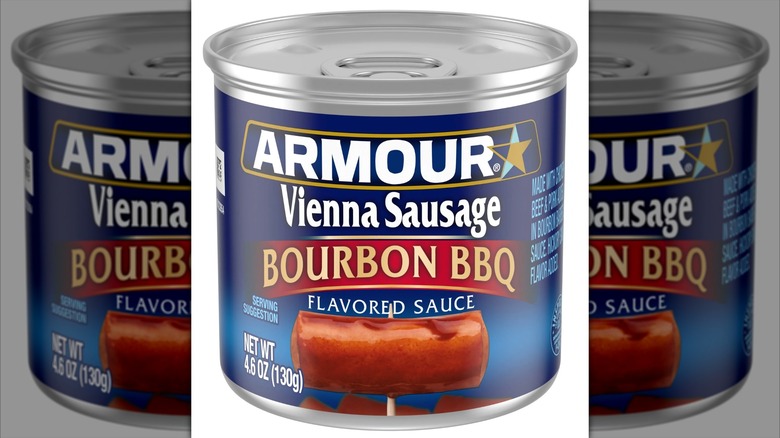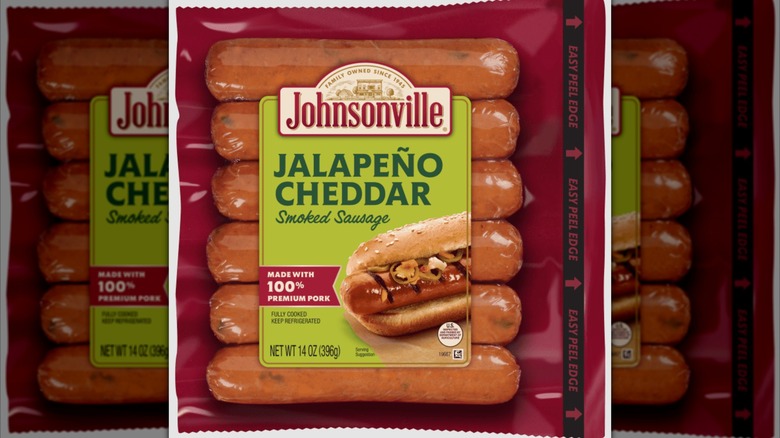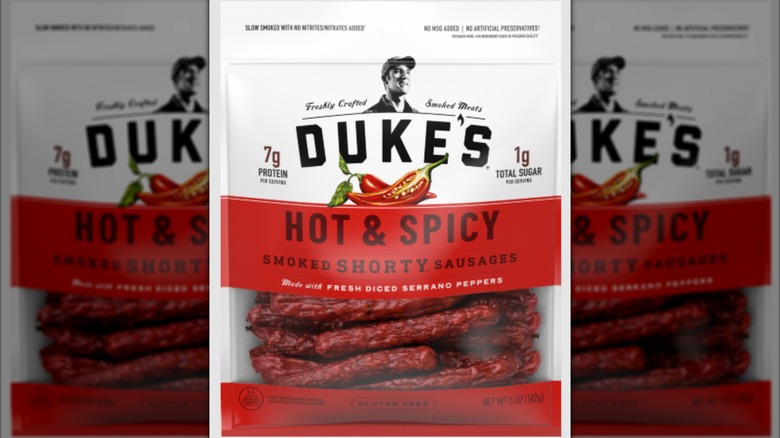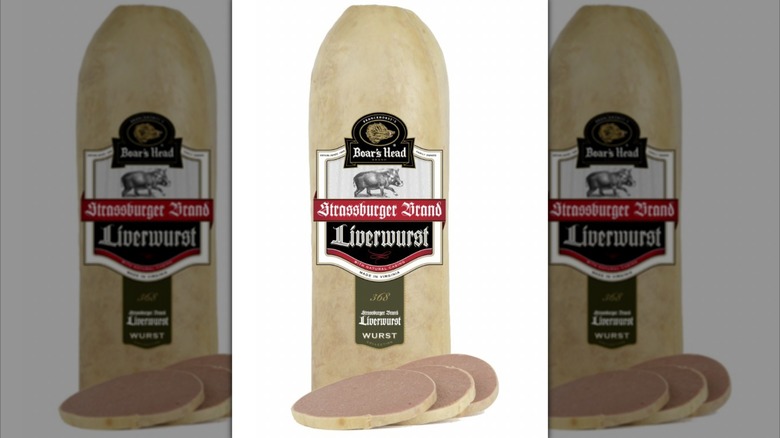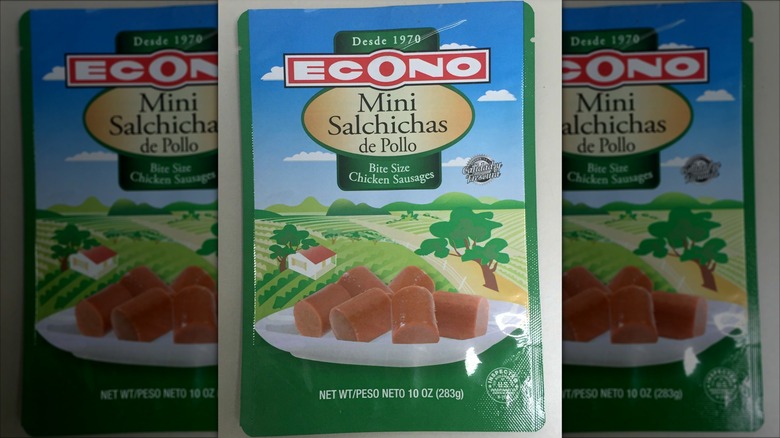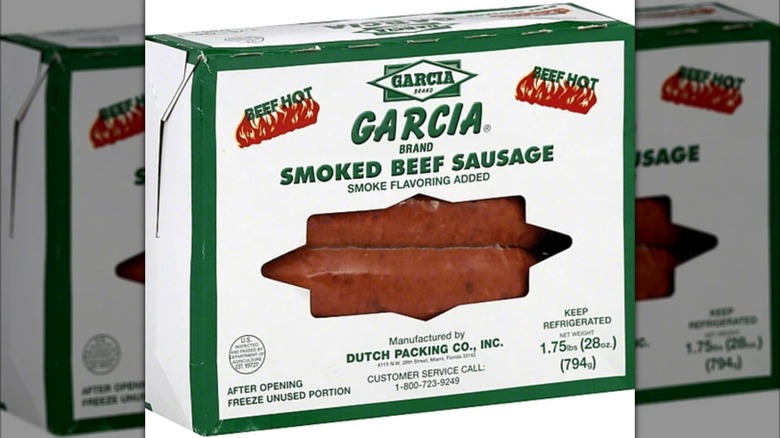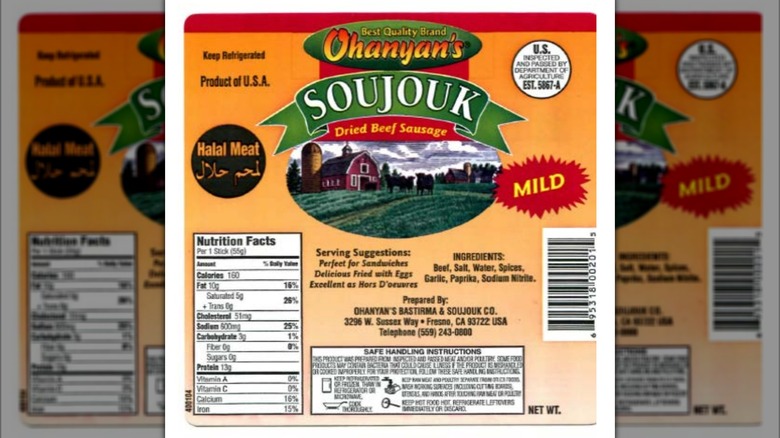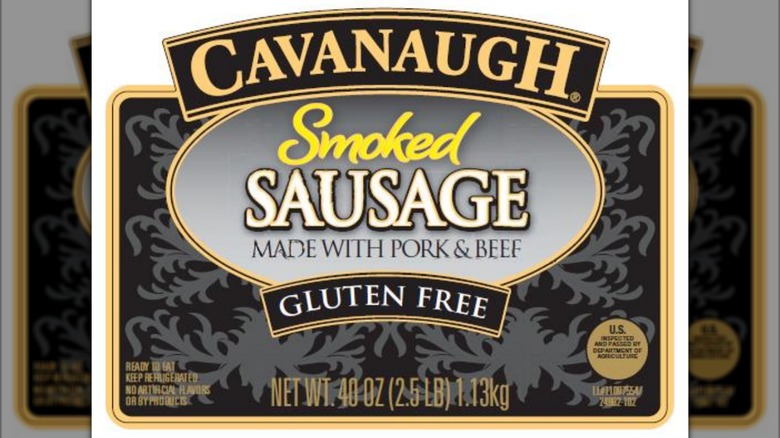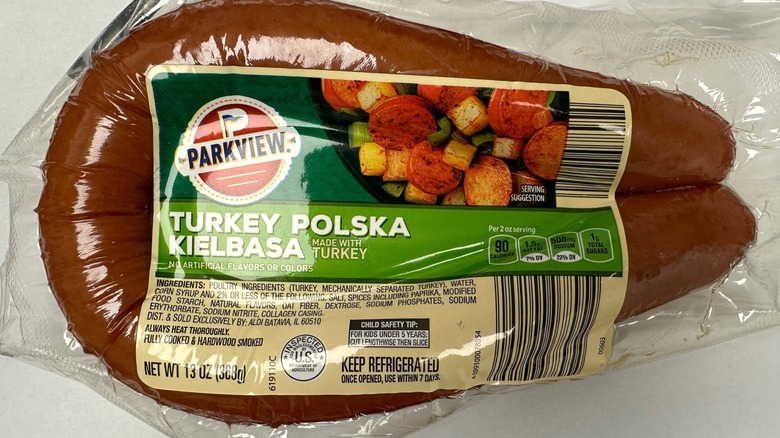14 Of The Biggest Sausage Recalls Throughout US History
We may receive a commission on purchases made from links.
Sausages are one of the most accessible meat products out there, and as a result, they're everywhere. Head into any large supermarket, and you'll have dozens of brands and options to choose from, in a variety of shapes, sizes, and flavors. Unfortunately, more products means more opportunities for things to go wrong — and with sausages, there have been some spectacular failures. Ever since sausages could be bought in stores there have been mistakes, and some disastrous manufacturing errors have resulted in absolutely massive product recalls.
While some sausage recalls have been relatively contained, others have involved hundreds of thousands or even millions of pounds of product. These recalls can be hugely costly for the businesses that have to conduct them, with millions of dollars spent on unsellable items, phone line operations, and any potential lawsuits that may arise. There's also reputation to think of. Companies can be significantly affected by customers turning away from their products in favor of other brands, even if the recall they're conducting is long finished. Unfortunately, none of the sausage recalls we found were likely to be a lot of fun for the food companies behind them, and we'd bet that they cost a pretty penny.
1. A packaging defect caused over 2.5 million pounds of canned sausages to be recalled
Canned sausages may not be everyone's thing, but you can at least rely on them to be reliable: Most of the time, the product will look, smell, and taste like what you expect it to. However, that's only if the can itself is safe and secure. If it isn't, you may have some problems on your hands. This was the case in 2023, when Conagra Brands, one of the largest processed food companies out there, had to recall an eye-popping amount of its canned sausages. The company had discovered that some of the cans were leaking, and promptly alerted the authorities, while also identifying the fact that some customers may have bought cans that they couldn't see were damaged.
The fear was that pathogens may have been able to enter these cans without the customers realizing, which could then lead to the food inside becoming either spoiled or highly dangerous. As such, a recall was announced ... and it was big. Conagra had to hunt down well over 2.5 million pounds of its products, with a massive amount of Vienna sausages sold under various brand names. Nobody had reported becoming sick from eating the sausages, but this recall must have stung the company financially.
2. Improper labeling of a sausage casing led to a huge recall
When it comes to sausage recalls, sometimes it's not the sausage itself that's the problem, but the casing that contains it. This was the case (we're sorry, we couldn't resist the pun) in 2018, when J Bar B Foods had to recall almost 411,000 pounds of its H-E-B branded beef brisket smoked sausage from stores. The issue was that the sausage was enclosed in a pork casing that wasn't declared on the label, a problem that was only flagged when a customer enquired about the casing's ingredients to the company.
This was a clear instance of mislabeling, but it was slightly more than that. The pork casing posed a risk for people with pork allergies. Pork allergies are triggered by the albumin present in pork, and can produce the same symptoms that other food allergies do, including anaphylaxis (although this is pretty rare). Interestingly, it's uncommon for pork allergies to exist in isolation from cat allergies, and it's thought that the food allergy actually stems from the latter because of an intolerance to cat serum albumin. So we guess you can blame your cat for this recall ... Right? Kinda.
3. Nearly 50 tons of jalapeño cheddar smoked sausage were recalled due to plastic contamination
Sausages are highly processed, but when cheese is in the picture things get taken to the next level. Injecting all that cheese into each link means yet another step processing-wise, increasing the chance of things going wrong — and that's exactly what happened in 2019. Johnsonville had to recall nearly 50 tons of its jalapeño cheddar smoked sausage after a customer complained that they found hard green plastic inside one of them. Not exactly what you wanna be swallowing with your dinner, huh?
Johnsonville set to work recalling the sausages, but its efforts were made more complicated by the fact that they hadn't just been shipped nationwide, but internationally too. Thankfully, there was just one product the company had to track down, and as the sausages were only produced over two individual days, things were likely a bit simpler.
How exactly the plastic made it into the sausages is slightly unclear. It could be that a machine in the factory they were produced in had deteriorated and a piece of plastic had come away, or a plastic spatula or utensil was dropped in and then churned up in the sausage mix.
4. Monogram Meat Snacks had to recall almost 192,000 pounds of sausage after the products were potentially tampered with
We put a huge amount of faith in food producers to ensure that the items we buy are safe to consume and untampered with. While the vast majority of items arrive on our shelves as just that, every now and then things can take a slightly sinister turn. In 2019, Monogram Meat Snacks was forced to recall a huge amount of its sausages — 191,928 pounds, to be exact –- after it was discovered that its products may have been tampered with. As a result, the company was concerned that the sausages could potentially be contaminated and thus no longer be safe to eat.
It should be pointed out that the potential tampering occurred after the production process was finished, but other than that, details about what the nature of the tampering was were pretty sparse. This may have been to prevent people panicking about what had happened to their food, but we can't help but feel that it's a little shady for the true nature not to be revealed. Regardless, Monogram Meat Snacks stressed that no one had become sick because of the tampering, but the whole affair left a bit of a question mark above the company.
5. A Listeriosis outbreak was linked to Boar's Head liverwurst
One of the scariest, and biggest, recalls in recent memory started with a simple sausage. In July 2024, Boar's Head Provisions Co. announced a recall of its liverwurst following an outbreak of Listeriosis that was linked to the sausage. Not only did it infect dozens of people across multiple states, but it eventually led to the death of 10 individuals over many months.
The initial recall of liverwurst was far from insignificant: Well over 200,000 pounds of product had to be tracked down. And things were only gonna get worse from there. Just four days after the first recall, Boar's Head decided to take the huge step of recalling every single product that was produced in the same facility as its liverwurst. A massive 7 million pounds of items had to be recalled due to public health and safety concerns.
Unfortunately, those concerns were well-founded. The deadly Boar's Head Listeria outbreak will go down as one of the most consequential events in food history. Extensive enhanced health and safety measures were put into place by Boar's Head, its liverwurst was permanently discontinued, and the brand's reputation was affected for good.
6. Over 90,000 pounds of sausage was recalled after metal was found
Call us old-fashioned, but we really don't want metal in our sausages, y'all. Is that too much to ask? Apparently, in 2017 it was, if you were buying Eckrich-brand cheddar breakfast sausages. The sausages, which were produced by Armour Eckrich Meats, were found to have pieces of metal embedded in them. Nobody had become injured or sick from eating them, but naturally a recall still had to be initiated — and Armour Eckrich Meats were left having to track down over 90,000 pounds of product.
As with so many recalls that involve metal pieces getting into food, the Food Safety and Inspection Service weren't super forthcoming about exactly how they ended up in the sausages. The truth is that it could have come from loads of different sources, from faulty equipment to misplaced tools. Whatever the cause though, obviously, it's never safe to eat.
7. Undeclared MSG prompted a recall of almost 1 million pounds of chicken sausages
MSG, or monosodium glutamate, has had a lot of stigma around it for many years. While that stigma still persists amongst certain people, most folks nowadays are aware that MSG is generally deemed as safe. However, like any ingredient, it still needs to be listed when it's in packaged foods. When Century Packing Corp. failed to do so on its chicken sausages, it faced an almighty recall of almost 1 million pounds of product.
The MSG in its chicken sausages, which were sold in Walmart and other stores, wasn't added as an extra ingredient by the company. Instead, it was a sub-ingredient, having been added to the chicken bouillon in the sausages without being declared. It's worth noting that listing MSG isn't just common courtesy or logic, but something stipulated by the USDA as a must for meat and poultry products — so Century Packing Corp. was definitely at fault here. To make matters worse, it had been missing MSG from its ingredients list for approximately six weeks of production. The sausages were shipped everywhere and schools had also purchased them via the company, so its recall activities had to be pretty widespread.
8. A wide range of sausage products were recalled following metal contamination
Man, metal just loves getting into sausages, huh? In 2017, there was yet another instance of this happening. Florida-based Uncle John's Pride had to issue a recall of almost 140,000 pounds of meat and poultry sausages that were shipped to three states after someone found a piece of metal in one of the products. The company naturally worried that other pieces of metal had made it into the sausages and were shipped to customers, and it had to track them down and get them back.
The metal itself was not in shard or fragment form, but was instead a magnet. It's not entirely clear how the magnet made it into the source product, but they are commonly used in modern food production to sift out pieces of metal that may otherwise contaminate items. As such, it may have been the case that one of these magnets dropped off and into the food, making it not only useless but also pretty dangerous.
9. Misbranding and an undeclared allergen led to a huge recall of beef sausage
Have you ever seen the ingredient soy lecithin in your food and wondered what it is? It's likely that you have — it's everywhere. Soy lecithin is an additive derived from soy that's used as an emulsifier, and it also has a preservative effect on flavor. Although it doesn't have high amounts of soy and may not trigger an allergic response in a lot of people, for folks with more severe soy allergies it can still be dangerous and prompt symptoms.
As such, it's important for food manufacturers to list soy lecithin when they use it — and this is something that Ohanyan's Bastirma & Soujouk Co. failed to do in 2015. Two varieties of its dried beef sausage produced over a full year did not declare the presence of soy lecithin, which apparently was being sprayed into the packaging in canola oil. Although nobody had gotten ill from ingesting it, it's pretty wild to think that it took the company 365 days to realize what was happening. The result was a massive recall of almost 160,000 pounds of product and likely a significant dent in the company's income.
10. In 2014, peanuts caused a big chorizo recall
Modern food production is mind-blowingly complex, with ingredients going through a huge amount of processing and coming from all over the world before they're processed again into a different product. This opens up a massive amount of risk of cross-contamination, and can result in ingredients ending up in foods that you'd never expect to be there. In 2014, this was proved by a large chorizo recall conducted by Garcia Foods Inc., which had to claw back 190,450 pounds of products after discovering that peanuts could be inside them.
The route that these potential peanuts took was kinda convoluted. The issue was flagged to Garcia Foods after the U.S. Food and Drug Administration, or FDA, released another recall for cumin products that were apparently used in the chorizo. The cumin recall was prompted by undeclared peanut proteins that may have been in some of the products, and these proteins weren't declared on the product label. Aside from the fact that we're not sure why peanut proteins would be in cumin seasoning blends anyway, these recalls go to show how complicated the making of modern food is, and how careful food manufacturers need to be.
11. Almost 55 tons of smoked sausage were recalled when customers found plastic inside
Plastic gets in the strangest of places, and it can end up in food way more often than we'd like. In 2018, this happened yet again. Johnsonville, LLC, a company that's seen a fair few recalls in its time, had to put out a recall notice once more for one of its sausage products. This time, it had to do so because customers had found hard, green plastic in its smoked pork sausages.
This wasn't an isolated occurrence: Three people reported that they found plastic pieces, which clearly flagged that more could be out there. As such, Johnsonville had to spring into action, and it was faced with a pretty massive amount of product to get back. Almost 55 tons of smoked sausages were potentially affected, and as these products had been shipped nationwide it likely had a lot of paperwork to do. Somewhat usefully, the products being recalled had all been produced under two batch numbers, making them slightly easier to track down.
12. Undeclared soy caused a national recall of sausages
Another day, another undeclared allergen. This time, it was soy's turn to be left off a product label. In 2014, New York-based Zemco Industries had to put out a large recall of its smoked sausages due to soy not being declared on the label. 106,800 pounds had to be tracked down, and the company wasn't helped by the fact that they had been sent all over the country to be sold in stores.
The issue occurred due to classic human error. Zemco Industries had made a change to its smoked sausages to remove soy from the recipe, but it turned out that some of its employees missed the memo and made them using the old formulation. These sausages containing soy were then shipped out in their new labels, which stated that there was no soy to be found. Pretty big mistake, right? The good news was that no one had an allergic reaction from eating these at the time the company discovered the mistake and put out the recall.
13. An enormous recall of sausage products took place following a multistate Salmonella outbreak
While food recalls are usually pretty serious, a lot of them pass without incident. Unfortunately, others come as a result of perilous circumstances and outbreaks of harmful diseases. This was the case in 2010, when products made by a Rhode Island firm called Daniele International were identified as containing Salmonella. The recall came in the midst of a multistate outbreak of Salmonella Montevideo infections, which eventually resulted in hundreds of cases across the country. As part of the investigation into the infections, the Food Safety and Inspection Service (or FSIS) tested Daniele International's salami products, and found that they contained Salmonella.
This prompted Daniele International to put out a hefty recall of its products. It initially had to recall well over 1.2 million pounds of its salami products, before revising the recall to include another 23,754 pounds of items a few weeks later. Importantly, the FSIS didn't initially find a direct link between the salami and the Montevideo infections, but it later appeared that black and red pepper used to make the salami may have been responsible.
14. When bone fragments were found in kielbasa, a large recall was announced
Kielbasa is a lot of things (although it isn't andouille sausage, folks). .It's garlicky, salty, sharp, and a little bit smoky, but what it shouldn't be is full of bones. Sadly, this was exactly what certain kielbasa were at the start of 2024, after Salm Partners had accidentally manufactured and sent its products out with bone fragments inside them. Several customers reached out to both the company and the FSIS to alert them of their findings in the turkey sausage, which then led the two to team up and issue a recall. One customer experienced a minor oral injury from apparently chewing on the bone, but luckily no further harm was done.
Unfortunately, too, this wasn't a small recall. Salm Partners had to recall 133,039 pounds of sausage in total. As the sausage had been shipped nationwide, it had to likely call a lot of supermarkets and grocery stores to try and find it.

